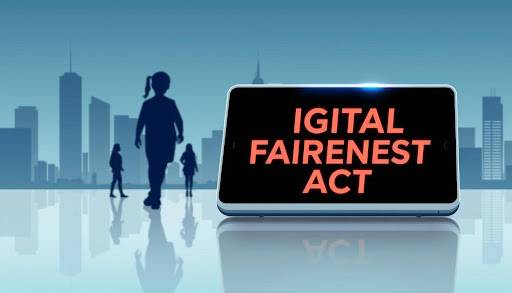Europe has developed the Digital Fairness Act to control the Big Tech business activities, especially when it comes to the use of Dark Patterns and Influencer Marketing. This important law will help build a more fair online-world since it will shift the burden on the manipulative design trends and dark advertising.
Big Tech:
The mission of action of the EU is linked to the problem of consumer abuse by Dark Patterns, specific design controls developed to distort or mislead the user. Also, the Act attempts to bring more clarity in Influencer Marketing and sponsored content is clearly labeled.
Key Takeaways:
- A new EU law, the Digital Fairness Act, would control the practices of Big Tech.
- The Act is aimed at Dark Patterns and unfair design tricks employed by organizations.
- One of the main concerns of the legislation is the Influencer Marketing transparency.
- The Act fulfils the purpose of providing a more balanced digital landscape in the interests of consumers.
- The violation of the Act can lead to punishments of a large scale.
What is the Digital Fairness Act in EU?
The Digital Fairness Act, one of the most significant laws to be enacted by the EU, targets to prevent the actions of Big Tech companies on the market. In order to understand the importance of this Act, it is necessary to realize the concepts the Act discusses, namely, dark patterns and what effect could they have on consumers.
What Are the Dark Patterns?
A dark pattern is a persuasive aspect of design employed by technology businesses to manipulate consumers and even to a user, deleterious to the wishes of the user. This may contain misguiding interface, concealed charges, or convoluted terms and condition.
The Objectives and Significant Provisions of the Legislation:
This is expected to be addressed with the Digital Fairness Act which is to ensure that dark patterns are removed and that digital markets foster transparency and fairness. Other essential points are the tighter rules to influencer advertisement, declaring all disclosures, forbidding secret advertisement.
Implementation Timeline:
Implementing the Act is projected to be a gradual process in the coming two years by which time companies will have time to stay within the new regulations. This gradual implementation will facilitate businesses to allow time in adjusting their practice and a gradual smoother change.
How the Digital Fairness Act Question Marks Big Tech Practices:
The Digital Fairness Act has the potential to become the first significant attempt of the EU to curb the practices of the Big Tech. This law is expected to make the digital landscape more fair by cracking down on fraudful behaviour especially regarding influencer marketing and dark patterns employed by technology giants.
Influencer Marketing requires new Regulations:
Digital Fairness Act proposes new regulations in the sphere of influencer marketing that has gained enormous growth and abuse. Now, the influencers will have to follow more rigid standards to keep their promotional actions open and honest.
Transparency Requirements:
The influencers have to declare to their followers that the post is sponsored sufficiently. This implies speaking in simple terms which are very easy to comprehend without obscurity or veiled confession.
Disclosure Standards:
The Act establishes certain disclosure principles which should be communicated to the influencers. These are the visibility and apparent labels on sponsored content and their viewers are complete with the knowledge of the promoted/ad quality of content.
Typical Dark Patterns by Tech Companies:
Dark patterns are a means of manipulating the user behavior used by tech companies. The so-called hidden costs, deceptive advertising, confusing navigation belong to the number of the most common ones. The Digital Fairness Act is meant to do away with such practices.

Dark Patterns:
The Digital Fairness Act puts into place powerful enforcement measures to make sure manufacturers comply with the regulations. Those companies that violate such rules will be highly penalized owing to fines. The veiled prospect of these penalties is meant to make companies change at their own initiative in anticipating the new rules.
Conclusion:
The Digital Fairness Act is a great solution to the situation involving the regulation of the practices of the Big Tech and the process of further fairer digital environment. Its sections related to Dark Patterns and influencer marketing will significantly affect the industry, as it helps to establish transparency and responsibility.
With the implementation of the Act, such companies as Meta and Google will have to adhere to the new laws to avoid penalties. The EU Digital Fairness Act is a step in the right direction and as far as industry stakeholders and consumers are concerned, the effect will be keenly observed.
Offering a proactive way to establishing the fair and transparent operations of Big Tech companies, the EU is set to establish the Digital Fairness Act. The given legislation can become an example of the future digital landscape leading to a more equal online environment amongst users.
FAQ:
What is Digital Fairness Act?
The Digital Fairness Act is a proposed law the EU has initiated to control the Big Tech operations, especially Dark Patterns and Influencer Marketing making the process transparent and fair.
What are the Dark Patterns?
Dark Patterns are the deceptive design features included in the work of technological companies to manipulate their users, sometimes in an opaque or unfair way to the customers.
What will the Digital Fairness Act mean to influencer marketing?
The Act necessitates that influencers engage in clear descriptions of sponsored posts, goodness of transparency, and holding one responsible in the industry.
What are the possible fines of the non-observance of the Digital Fairness Act?
Failing to meet the regulations can cause companies to incur high fines and penalties, and thus it is critical that they should adjust to the new rules.
When will the Digital Fairness Act be realised?
Act will be enforced within next two years with phased implementation that will give companies time to come within the act.


